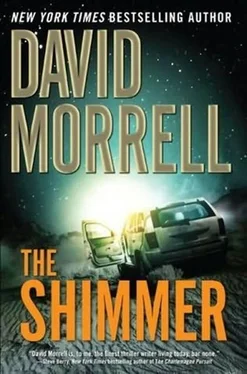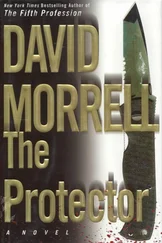“When I see the lights again, everything’ll be fine. They’ll make me forget what happened last night.”
“The trick is to distract your mind by paying attention to the small details. But I wasn’t thinking about last night. How are you feeling?”
Tori hesitated. “I never realized anything was wrong with me until the doctor phoned to tell me the results of my mammogram. Now I’m so self-conscious that I swear I can feel the thing growing in me.”
“On Tuesday, it’ll be gone.”
“I’d like to just reach in and claw it out with my fingers.”
“I love you.”
Tori looked at him. “You said that last night, too.”
Ahead, three TV news helicopters were silhouetted against the dark, cloudy sky. Vehicles were parked along both sides of the road. Taking his own advice, Page distracted himself by paying attention to small details and looked to the right toward the ruin of the World War II airbase.
He saw someone unlocking a gate. The man wore sturdy shoes, loose-fitting pants, a T-shirt, and an overshirt that hung below his belt. He was in his forties, bald and sinewy, with rigid shoulders and an air of authority. When he motioned for two dark Chevy Surburbans to drive onto the property, he had the manner of someone who was used to giving orders.
There was now a second sign on the gate.
“Tori, I want to check something. Please stop for a second.”
She looked at him reluctantly but applied the brakes as they came close to the gate. Page lowered his window and leaned out to get a better view in the dwindling sunset.
The older sign warned:
PROPERTY OF U.S. MILITARY
DANGER
HAZARDOUS CHEMICALS
UNEXPLODED ORDNANCE
The new one announced:
SOON TO BE
AN ENVIRONMENTAL PROTECTION AGENCY
RECLAMATION SITE
The authoritative man stepped through the gate, locked it, and noticed Page.
“Parking’s not allowed on this property.” He pointed toward the signs. “Restricted area.”
Page waved to indicate he understood.
Another man got out of one of the vans. He had a German shepherd on a leash. The authoritative man just stood there, staring at the car until Tori drove on.
“What was that about?” she asked.
“I’m not sure.” Page looked back and watched as the two Suburbans drove toward the collapsed, weed-choked, rusted airplane hangars.
Finally he couldn’t see them any longer, so he directed his attention ahead, toward the crowd. As Tori neared it, Page noticed that the county had brought a half-dozen more portable toilets. But they weren’t going to be enough. The crowd filled the entire parking lot all the way to the fence, onlookers standing where corpses had lain the previous night. People were on the road, forcing Tori to steer into the opposite lane. Medrano and other Highway Patrol officers struggled to keep order.
Tori parked at the end of the line of cars. Costigan’s windbreaker was on the front seat, and she snatched it up as she stepped from the Saturn. But as she stared toward the crowd a hundred yards up the road, she faltered.
“You okay?” Page asked.
“Too many people. I don’t think I want to go any farther.”
“Fine. We don’t need to do anything you don’t want to.”
“Maybe I can see the lights just as well from here,” Tori said uneasily. “Maybe the viewing area’s only an arbitrary spot.”
“Why don’t we stay here and find out?” Page suggested.
“Yes.” She shivered and put on the windbreaker. “After last night, I don’t want to go near a crowd.”
Raleigh waited at the fence until the blue Saturn drove on.
There were several troubling things about the man who’d leaned out the window to read the new sign that explained his team’s presence here. The man’s features were guarded, revealing nothing about what he thought. His hair was short-not military short but shorter and neater than was common among civilians. And his eyes were attentive, as if he analyzed everything he saw.
Definitely not just a tourist, Raleigh thought.
He kept waiting until the Saturn was obscured by the long line of cars that were parked along the side of the road. Then he turned to the dog trainer who had the German shepherd on a short leash.
“Put the fear of God into anybody who tries to come over that fence.”
As the trainer turned on his flashlight, Raleigh walked ahead of the two dark Suburbans, their only illumination coming from parking lights. He motioned for them to follow, leading them along what had once been a heavily traveled dirt road, its furrows now cluttered with weeds.
After a hundred yards, the last rays of sunset showed a wide row of collapsed airplane hangars to the left. Their corrugated metal had long since rusted. Scrub brush grew among them. Dirt had drifted against them. A lot of this was the work of nature, but some of it had been deliberately arranged to make the ruin look more dilapidated than it actually was.
Raleigh held up his hand, signaling for the vehicles to stop. He surveyed the old runway. Its concrete was visible only here and there, most of it covered with dirt. Weeds grew where numerous cracks had been baked into the pavement by the sun.
His grandfather had once stood here. It made Raleigh feel tremendously proud that a circle was about to close, that a mission his grand- father had started so long ago was finally about to be accomplished.
In World War II, when the hangars and the runway were freshly constructed, this would have been a scene of intense noise and activity, enough to make one’s heart pound. Hundreds of airmen had trained here every month, practicing bombing runs and aerial dog- fights in a place so remote that only the cattle, coyotes, and jack – rabbits were inconvenienced by the commotion. But training airmen had just been the cover story.
A breeze swept dust across the decay. When the darkness was thick enough to conceal them from prying eyes, Raleigh pointed toward a hangar that seemed less collapsed than the others. The Suburbans followed, and he tugged away a section of corrugated metal, revealing a space large enough to allow a vehicle to enter the hangar.
Once they were inside, Raleigh pulled out a flashlight and examined a thirty-foot-high pile of debris that appeared to be the result of a clean-up effort long ago. Pushing aside some of the debris, he un- covered the edge of a camouflaged radio dish that was aimed toward a similar dish at the observatory. After verifying that the dish hadn’t been disturbed, he edged behind some of the debris and pushed a button.
A portion of the concrete floor rumbled as it descended to form a ramp. Lights shone up from below, activated by the same button. His footsteps crunching on dirt, Raleigh walked down the ramp into a rush of cool underground air. The Suburbans followed him slowly, and the moment they reached the bottom, he stepped to a wall, where he pushed another button. The ramp ascended, becoming part of the ceiling.
As the men clambered out of the vehicle, Raleigh said, “Sergeant, assemble the team.”
Seconds later, they stood in a row before him.
“Gentlemen.” His voice reverberated off the concrete walls. “You’re beneath Hangar 8 of an airfield that was a training facility for U.S. military flight teams during World War II. The hangar and this area weren’t part of that effort, however. Only personnel with top-secret clearance were allowed in the hangar, and even fewer were allowed down here. The explanation was that the prototype for a new bomber was being assembled in the hangar and readied for testing. Trainees cycled through the program so quickly that they never stayed long enough to wonder why the bomber wasn’t completed and flown.
“You’re familiar with the race to develop the atomic bomb during the Second World War. The location for that project’s main research facility, Los Alamos, was on a remote, difficult-to-reach mesa in New Mexico. This underground area enjoyed similar advantages and had a similar purpose. If it seems out of the way now, imagine how truly out of the way it was in 1943, when the project began. The objective was to develop a weapon quite different from the atomic bomb. In a way, Hangar 8 and Los Alamos were racing against one another as well as the enemy. Of course Los Alamos won the race. In fact, the first atomic bomb was detonated at what’s now called the White Sands Missile Range, just two hundred and fifty miles north of here, and after two of those bombs ended the war in the Pacific, the urgency to develop a parallel weapon lost its force.”
Читать дальше












